"Multi-cloud" should just mean "all the computers"
Also, the smells of platform engineering and frozen pizza.

Each year when we do the State of Kubernetes survey, we’re of course interested in “multi-cloud.” That’s one of the reasons to use a Kubernetes management suite stack, like VMware Tanzu. The term can mean many things. The most obvious one is “using multiple clouds.” The motivations here can be to use best of breed features, geographic/sovereign cloud needs, and doing the old “we could always go to your competitor if you raise prices too much” gambit.
I covered the motivations to do multi-cloud our survey discovered in a blog post today, and also added in some of my own. And I found the chart above, which is fantastic.
The above chart shows what I think “multi-cloud” really - should - mean: it’s just all the computers an organization has to put up with. Here’s what I wrote in the blog post:
“It’s what we have” is a solid reason to use a multi-cloud strategy. This is simply the current reality for most large organizations. There are two sources of a diverse IT estate:
Years of loosely gardened IT strategy that favored business unit autonomy and speed over centralization and standardization
A steady stream of acquisitions that bring entirely new IT estates into the organization. Think of rental car agencies buying each other, banks buying other banks to stabilize the financial system, or just your regular large company expanding its business by buying a small, innovative company.
As you see in the IDC surveys above, there’s some slight movement and shifting in various categories of infrastructure and services, but not much.
The focus of “multi-cloud” isn’t one application, it’s all the applications inside an organization.
Check out the rest of the “why multi-cloud” analysis in my blog post.
Original Content
Two podcasts for you:
I totally screwed up my scheduling so I missed this week’s Software Defined Talk recording this week. Pretty dumb-head move of mine. This week, it’s: Cloud Earnings, OpenCost and Opensource Redflags. Plus, Matt recounts his epic return trip home from Amsterdam.
The Smells of the Kubernetes Community, this week’s Tanzu Talk podcast: We discuss what we did at KubeCon, the recent VMware State of Kubernetes 2023 survey, and the smells of platform engineering maturity. Also, some tips on daily logging and to do list management.
Want to hear how large companies fix up their legacy applications? On May 11th, you can hear from Marc Zottner and me on just that topic, for free as part of the Golden Path to Spring One online conference. Join us on May 11th, 2023.
Upcoming
Talks and other events of mine that’re coming up.
May 11th, 2023 Devoxx UK in London. Get 25% tickets with the code SEEMESPEAK23. June 1st VMUG Belgium in Brussels , free. June 7th State of Kubernetes overview, online. June 8th to 9th PlatformCon, online. June 22nd to 23rdDevOpsDays Amsterdam, attending. August 21st to 24th SpringOne & VMware Explore US, in Las Vegas. Sep 6th to 7th DevOpsDays Des Moines, speaking. Sep 18th to 19th SHIFT in Zadar, speaking.


